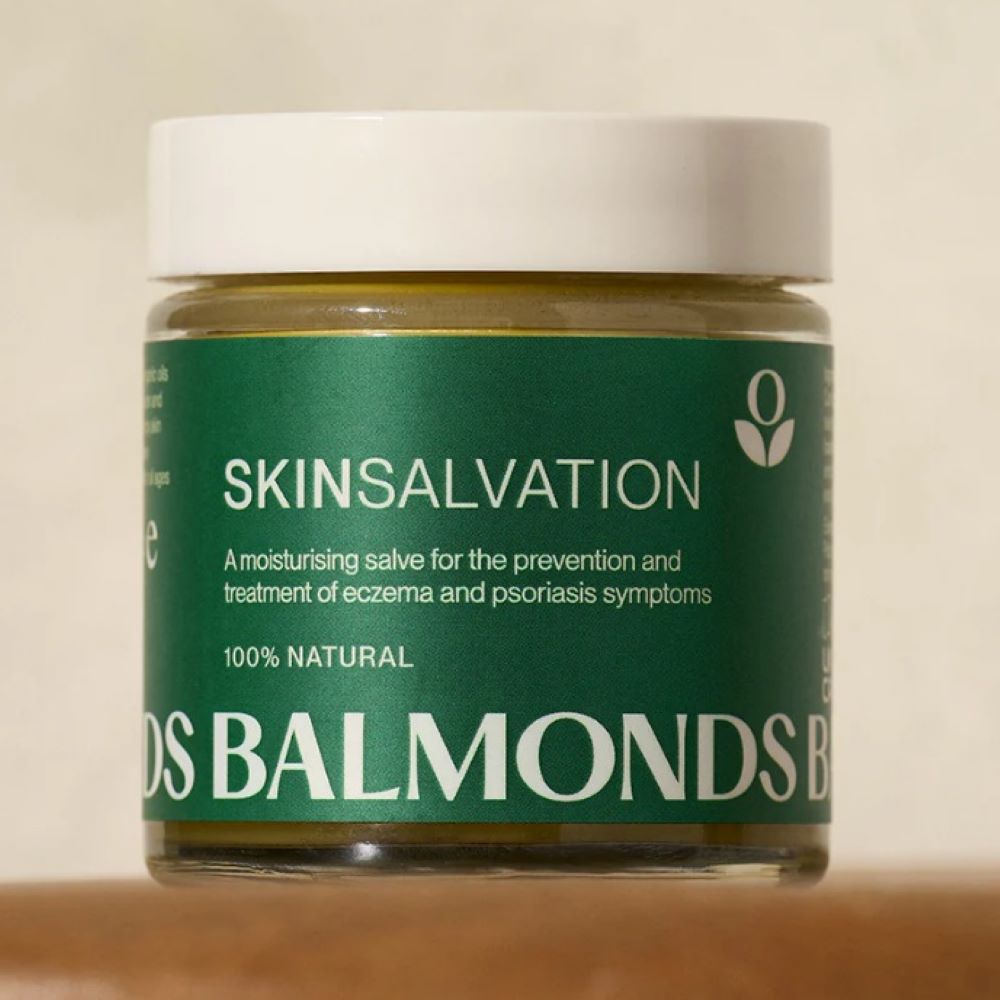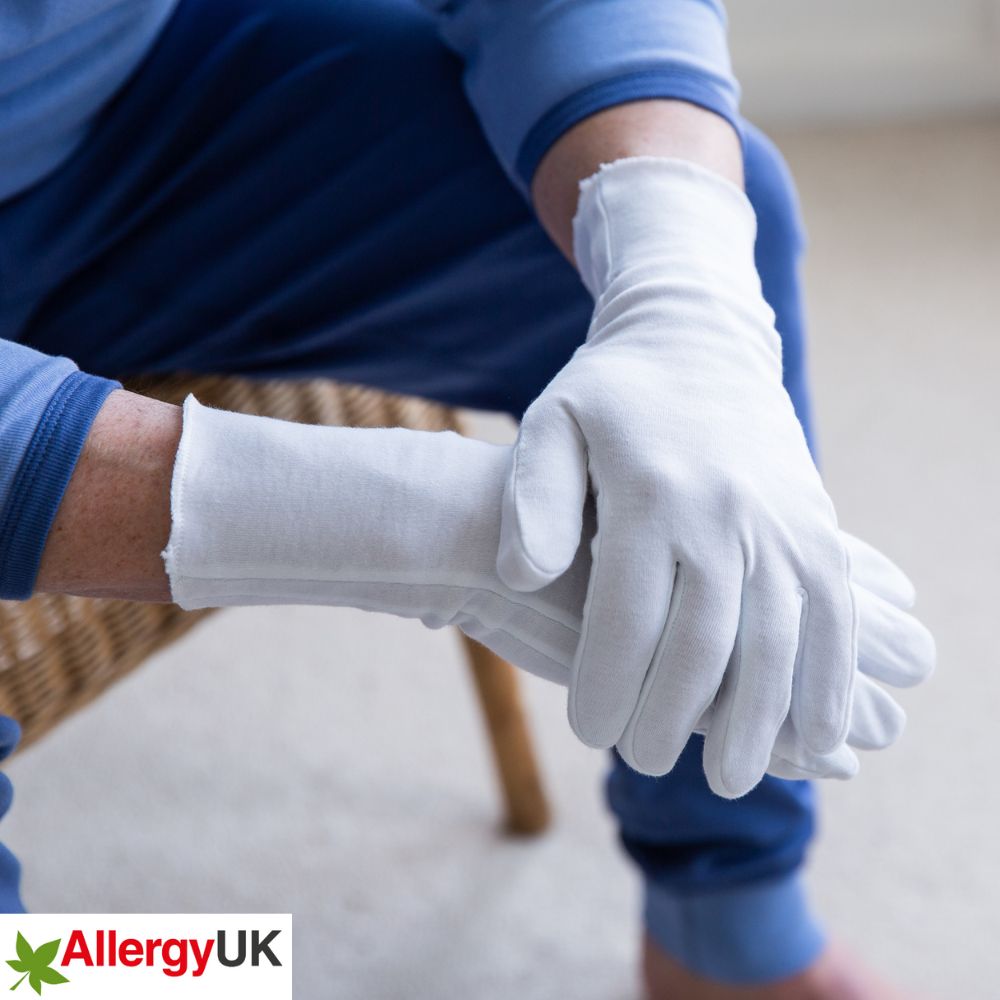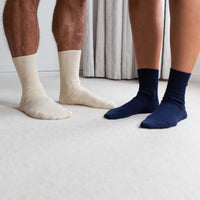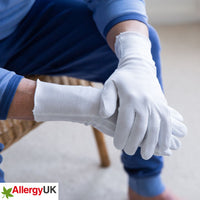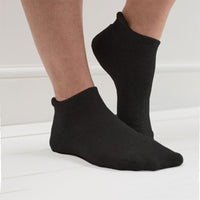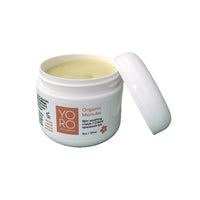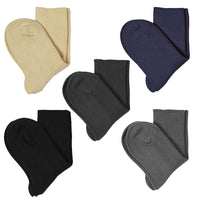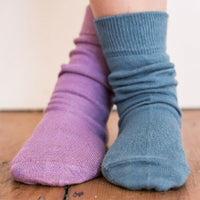
More Than 'Just Itchy Skin.'
More Than 'Just Itchy Skin.'
A recent survey by Allergy UK (Not Just Skin Deep – 2022) found that 78% of patients surveyed admitted eczema had negatively impacted their mental health. Yet 93% were not aware of any mental health support.
As part of mental health awareness month, Jo, Cotton Comfort’s MD, describes the impact severe eczema and allergies had on her family, how they dealt with it and her top tips.
This is an excerpt of a 'Patients Voice' piece Jo has written for the British Dermatological Nursing Group journal coming out in June.
Jo’s story
16 years ago, my then baby daughter Bonnnie, had severe eczema.
Being the parent of a child with a severe skin condition was so much harder than I’d ever imagined, not that I’d given it a lot of thought before. The sleep deprivation, distress, financial toll and isolation the condition brought on felt completely overwhelming and at times unbearable.

How it started...
Our journey with Bonnie’s eczema started when she was just a couple of months old with a few itchy red patches on her body. My husband and I and our elder daughter (then nearly 2) had mild eczema so at first we dealt with it as we had our own and were supported by our local GP – using emollients and mild steroid cream. But it quickly got out of hand and spread over around 90% of her body.
She would spend most of her time awake, writhing around and trying to scratch. It was incredibly distressing, not only because she was so small, helpless and clearly in pain, but also because her body was covered in crusty, yellow oozing infected skin which was just awful to see.
Her weight plummeted and she dropped down below the 2nd percentile as she used up so much energy squirming around trying to scratch.
We desperately looked for solutions and did what we could to remove potential allergens from her environment - removing or cleaning carpets, minimising use of chemicals, using non-bio washing powder etc. I wasn't sure what difference it made but at least it made me feel I was doing something positive.
Feeling judged?
We didn't go out much and at home I carried her around with one arm through her legs and my hand firmly holding her chest with her facing out so she couldn’t rub her cheeks on my shoulder. I was breastfeeding and tried cutting any possible allergens out of my diet in case they were making her skin worse. It took a friend of mine who came round to tell me 'you look awful' to make me realise I needed to eat properly and look after myself if I was to help Bonnie.
When we did venture out I often felt people were judging me when they saw me push my itchy, red, writhing child around the park in a buggy with her hands held down under the straps. I’d look straight ahead, walking fast, trying not to cry or catch their eye, so I ended up feeling quite isolated and lonely.
I now look back and think that if I'd asked my friends and family for more help or found a supportive play group it would have made life more bearable.
Worrying about what she would wear out, to minimise any irritation from carpets or furniture she came into contact with, didn't help and made me realise how hard it was to find suitable clothing for her.
Sleep deprived
The negative impact of severe sleep deprivation is massive - that's why it's used as a tool of torture after all! Even limited sleep deprivation negatively impacts our diet, our energy levels and makes us irritable and unhappy.
At night I would lie her on her back in her cot and take it in turns with my husband to hold her hands down to stop her rubbing herself raw, until she fell asleep, so we were all exhausted.
Fortunately when Bonnie was about 9 months old a friend told me about Cotton Comfort and their special organic cotton sleep suits with integral mittens, especially for kids with eczema. We invested in some of these and incredibly they changed our lives – as she finally slept better and as a result so did we.
To help her (and us) sleep, we also tried to create and stick to a clear routine which included a luke warm bath and time in front of a favourite TV programme while we applied any cream and put on her Cotton Comfort Eczema Scratch Mitten PJ.
I was so grateful and loved the clothes so much that 15 years later I looked them up and if you’re reading this you probably know how that story went...

Quality of Life and Mental Health
Our quality of life was definitely impacted – not just our day-to-day family life but our relationships with each other.
Because Bonnie got so much attention we had less time and energy for our other daughter, resulting in jealousy and resentment on her part and guilt on mine. Years later my husband and I had marriage counselling and realised that the stress we went through in this period caused deep resentment and misunderstandings. Happily, we got through it but I know others who aren’t so fortunate. It's made me realise how important communication is; and if you struggle to talk to your parent or partner, it can really help to involve someone else in the conversation.
A study in 2006 on the “Quality of life and childhood atopic dermatitis: the misery of living with childhood eczema” states that
“The misery of living with atopic eczema (syn. dermatitis, AD) cannot be overstated for it may have a profoundly negative effect on the health-related quality of life (HRQoL) of children and their family unit in many cases. https://pubmed.ncbi.nlm.nih.gov/16893440/
A more recent report from Allergy UK (Not Just Skin Deep – 2022) confirms that severe eczema continues to be a source of considerable and relentless distress to those who live with the condition; distress that is both physical and psychological.

Growing up
Leaving London when Bonnie was almost 2 gave us more space and better air quality, reducing the chances of developing asthma. I also believe being near or having access to nature brings real mental health benefits, which in turn reduce stress and stress induced skin conditions (like eczema).
Starting school, going to parties and visiting friends houses meant Bonnie grew up fast, often appearing mature beyond her years as she learnt to watch out for potential allergens.
She was (and still is) allergic to dairy, egg, nuts and sesame, animal dander and pollen. Watching others wear pretty dresses with bare legs and arms, eating pizza and cake, was hard. Visiting friends, especially if they had pets, was a minefield. Wearing 100% cotton long sleeves and leggings or tights became the norm for Bonnie and I struggled to find suitable clothes, sometimes making my own, until I found Cotton Comfort.
From an early age she carried her own anti-histamine and adrenaline pen (with me carrying a back up). She thrived on being given responsibility for this and on several occasions self medicated with anti-histamine when she could feel her lips tingle, before letting me know.

Going Abroad
We took our first holiday abroad when Bonnie was 2, carefully researching options and finding a hotel able to deal with food allergies and with a sea salt pool, as chlorine and sand exacerbated her skin. We discovered allergy cards (https://www.allergyuk.org/our-services/translation-cards/) which helped us feel more confident explaining her allergies in different languages. We'd take some food and snacks for her plus our own washing powder and pillow case.

More recently, as a teenager she has travelled independently or with school, which has at times been terrifying – like when she flew on her own weeks after the Pret scandal where a teenager died on a BA flight, and we have always felt it is important that she leads as normal and full a life as possible.
Jo’s top eczema and allergy related mental health month tips

- Get enough sleep – create an evening routine and stick to it. Make time for a shower or bath and applying any creams in front of a favourite TV programme.
- Lean on your support networks - Talk to your family and friends – be open and help them understand the issues, don’t assume they do or that they should do
- Write a list of you/your child's positive attributes, your skin doesn’t define who you are.
- Identify some practical measures to take - remove or clean carpets, soft furnishings or toys that attract dust mites, pollen and other allergens. Minimise cleaning chemicals.
- Use 100% Organic Cotton clothing (especially nightwear) and bedding. Wash it at 60 degrees (with non-bio) to remove creams, dead skin and allergens.
- Give children responsibility – allow them to take charge of aspects of their routine and carry their own medication. Enabling them to be more independent will help both carer and child.
As well as our life changing clothing we want to provide helpful objective information and to develop a community so nobody with eczema feels alone. We are growing our itchy skin community through our blog articles (like this one) and our Instagram, Facebook, Twitter and Linkedin page. Please do follow and join in.
Some useful online resources if you are struggling with your mental health;
https://www.allergyuk.org/wp-content/uploads/2021/11/Not-Just-Skin-Deep-min-compressed.pdf
https://www.nhs.uk/every-mind-matters/
https://www.skinsupport.org.uk
https://www.changead.co.uk/mental-health-with-atopic-dermatitis

